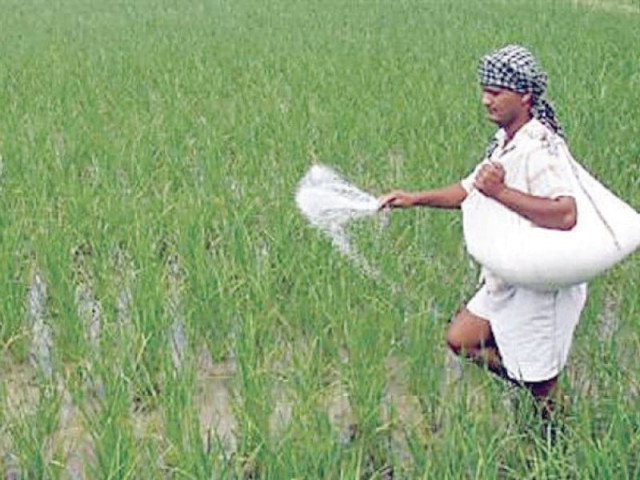Farmers await imported urea supply
Govt fails to finalise mechanism for delivery of urea as dealers fleece growers

The failure of caretaker administration to finalise a mechanism for urea delivery to farmers is leading to a multibillion-rupee scandal, resulting in the plunder of money by fertiliser dealers.
Already, the government has imported 220,000 tons of urea costing nearly Rs30 billion, which was sent to National Fertiliser Marketing Limited (NFML) warehouses on December 25 last year.
However, the imported urea has not yet reached farmers, who were supposed to receive supplies for planting the current wheat crop.
Now, the food security ministry is expecting the delivery of imported urea to farmers either by the end of February or March, which will available to them in May for next crop cultivation.
Earlier, the Economic Coordination Committee (ECC) had decided that fertiliser manufacturers would lift stocks of imported urea from NFML storages to provide it to farmers at the basket price. However, the mechanism has not yet been finalised and the commodity is still stuck at NFML warehouses.
The imported urea was meant to be provided to farmers and released in the market to push down its prices. However, the farmers were either denied the provision of urea due to its scarcity or they got it at double the actual price at more than Rs6,000 per bag.
To avert shortage and meet demand, the caretaker government had decided to import 220,000 tons of urea from Azerbaijan but, according to sources, it could not determine a procedure for the delivery of fertiliser to the market. Farmers too have not got any benefit from the imported urea.
They were in dire need of urea for wheat crop sowing in December and January, but were forced to buy the commodity at high prices.
Earlier, the cabinet voiced concerns over the alleged fleecing of farmers by fertiliser manufacturers despite receiving heavy subsidies on gas supply. Cabinet members noted in a meeting that a high subsidy was being given to fertiliser companies, however, its impact was not being passed on to farmers, who were compelled to buy fertiliser at exorbitant prices.
Read Farmers still grappling with urea availability
The ECC of the cabinet, during its meeting, approved a basket price mechanism for the locally manufactured and imported urea following refusal by provinces and the finance ministry to share the subsidy burden. The ECC was told that the cost of financing would be charged only on 220,000 tons of imported urea.
The cabinet body agreed that NFML should determine the price for the release of imported urea while the Finance Division reiterated that no additional subsidy would be provided once the proposed basket price mechanism was enforced.
The Ministry of Industries and Production briefed the meeting that the ECC had allowed the Trading Corporation of Pakistan (TCP) to import 220,000 tons of urea from Azerbaijan’s Socar company in a government-to-government (G2G) arrangement, which was ratified by the cabinet. The ECC agreed that the cost of subsidy would be borne by provinces.
In another decision, it was agreed that the recovery of the cost of imported fertiliser would be made from provinces.
TCP told the meeting that the import of 220,000 tons was estimated to cost Rs27.489 billion and the landed price of a 50kg bag was calculated at Rs6,248.
It was decided that the locally manufactured urea and imported urea would be treated as one basket. Based on previous practices regarding local urea and full cost recovery of imported urea, a price matrix would be determined for the local manufacturers.
It was agreed that a committee would engage in talks with urea manufacturers and finalise an implementation mechanism.
Further discussions were held with the manufacturers and a mechanism for the disposal of imported urea was agreed upon. It was informed that urea manufacturers would lift 220,000 tons from port and NFML warehouses based on their share of local production as a one-off arrangement.
Published in The Express Tribune, February 6th, 2024.
Like Business on Facebook, follow @TribuneBiz on Twitter to stay informed and join in the conversation.




1733130350-0/Untitled-design-(76)1733130350-0-208x130.webp)













COMMENTS
Comments are moderated and generally will be posted if they are on-topic and not abusive.
For more information, please see our Comments FAQ